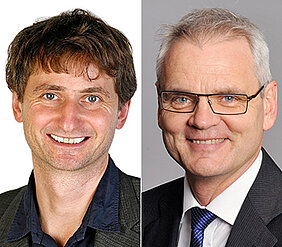Würzburg to accommodate new Helmholtz Institute
10/13/2016Now it's official: The Helmholtz Association has resolved to establish a Helmholtz Institute at the University of Würzburg. The new spin-off will focus on researching infectious diseases and new therapies.

The Senate of the Helmholtz Association has decided that the Helmholtz Centre for Infection Research (HZI) in Braunschweig will set up a new Helmholtz Institute in Würzburg in close collaboration with the University of Würzburg. The new Helmholtz Institute for RNA-based Infection Research (HIRI) will study the so-called ribonucleic acids (RNA) and their role in infectious processes. RNAs are believed to be both highly promising targets for drugs and therapeutic agents. These potential benefits are to be harnessed using novel technologies.
"It's exciting that the Senate has approved the establishment of the Helmholtz Institute for RNA-based Infection Research," says Professor Dirk Heinz, the HZI's scientific manager. "The new institute will allow us to open up a huge field of research that offers great potential for innovations to develop new diagnostic and therapeutic agents to treat infectious diseases." Heinz also praised the good cooperation with the University of Würzburg during the HIRI's preparatory phase.
Professor Alfred Forchel, President of the University of Würzburg, was pleased about the decision to expand the extramural environment by this top-notch research institution. "The Helmholtz Institute for RNA-based Infection Research is a key element of our efforts to expand the extramural environment of the University of Würzburg and will produce internationally renowned research results in close collaboration with the Research Center for Infectious Diseases. The University thanks the President of the Bavarian Parliament, Barbara Stamm, on behalf of all active supporters in the Bavarian parliament and the Bavarian state government for the great start-up funding that allows us to selectively promote the outstanding performance of Würzburg life sciences and especially of the scientific coordinator Prof. Dr. Jörg Vogel."
Ideal conditions in Würzburg
Würzburg offers ideal conditions for the new institute: Scientists at the Research Center for Infectious Diseases (ZINF) are already conducting research in the same field. Being part of a global network, the interdisciplinary research centre is highly recognised internationally.
Planning activities for the HIRI started in 2014 already. In May this year, an international expert committee rated the submitted concept as excellent. After the Senate of the Helmholtz Association has now given the green light for the HIRI's expeditious implementation, the supervisory board still has to vote to establish the institute in November.
First Helmholtz Institute in Lower Franconia
Bavarian Minister of Economic Affairs and Media, Energy and Technology, Ilse Aigner, has no doubts that the new Würzburg-based Helmholtz Institute is going to be a success: "We have created the financial prerequisites for the institute's development phase in the Bavarian budget worth 46 million euros, because we are 100% convinced of the project. I am delighted that this appreciation is shared by the top-ranking selection committee so that Lower Franconia will no longer be a Helmholtz-free district in the near future." In addition to Bavarian state funding, an extra 4.9 million euros in federal funds could be procured for large equipment.
"The significance of RNA molecules in infectious processes has been underestimated until recently. We know today that RNAs interact with various molecules of the host cell and of the pathogens. At the Helmholtz Institute for RNA-based Infection Research, we will use cutting-edge technology to look into these interactions to identify new target structures for therapies, for example," says Professor Jörg Vogel. Professor Vogel is a biochemist and the director of the Institute for Molecular Infection Biology (IMIB) at the Medical Faculty of the University of Würzburg and the spokesman of the Research Center for Infectious Diseases (ZINF). He will also take office as the HIRI's founding director.
Embedded in the Helmholtz programme "Infection Research", the HIRI is scheduled to establish four research subjects initially:
• RNA-based analysis of bacterial infections
• RNA-based analysis of viral infections
• RNA-based analysis of immune defence
• targeted application of RNA molecules for therapeutic agents, for example
The member institutions expect the HIRI to provide synergistic effects and deliver wholly new applications by bundling their expertise. The HIRI research activities aim to contribute to a better understanding of infections. The knowledge thus gained can subsequently be harnessed to develop new applications in prevention and therapy in combination with the translational expertise of both partners.
A milestone for Würzburg as a university site
Professor Matthias Frosch, Dean of the University of Würzburg's Medical Faculty, also welcomes the go-ahead for the new institute: "Establishing a Helmholtz Institute for RNA-based Infection Research is a milestone in developing Würzburg as a university site," says Frosch. According to Frosch, the establishment of the new institute is the result of a clear-cut strategic alignment of the Medical Faculty in the field of infection research, the recruiting of Professor Jörg Vogel as an internationally leading scientists and the selective promotion of excellent scientific talent.
He commends the Helmholtz Centre for Infection Research in Braunschweig as one of the most powerful partners of the Medical Faculty and highlights the long-standing close and trusting cooperation. Frosch also thanked the Bavarian parliament and state government that "has created the basis to substantially strengthen Würzburg as a science hub by making a considerable financial contribution".
Forward-looking research
"We initiated the Helmholtz Institutes to tackle issues relevant for the future in long-term partnerships with universities," says Otmar D. Wiestler, President of the Helmholtz Association. "They have proved their worth as an excellent model for this strategy in the past years. The HIRI is going to be another powerful example in the field of infection research. I expect the institute to gain importance far beyond the boundaries of infection research."
Contact
Prof. Dr. Jörg Vogel, Department of Molecular Infection Biology I,
Phone: +49 931 31-82575, joerg.vogel@uni-wuerzburg.de






